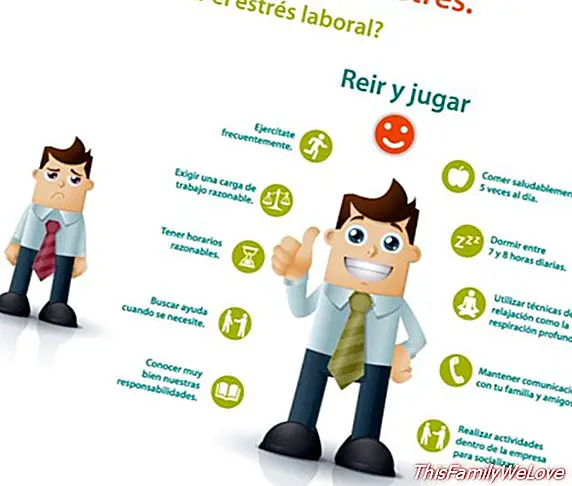10 steps to overcome work stress
The work stress it is a phenomenon that affects a high percentage of workers in the industrialized world and that entails a high personal, psychosocial and economic cost. Eliminating it completely is an impossible task and, perhaps not entirely convenient, since the stress has an adaptive and stimulating role at work, activating our imagination, intelligence and ability to work before difficult challenges or novel situations.
Regardless of the degree of stress, that from a certain level is harmful to health, the attitude we take when facing it and the management we make of it is essential to live it as something positive or negative.
The "bad" stress it paralyzes us and anguishes us "puts us in flight mode" (as this stresses me I avoid it). But positive stress activates us "puts us in a creative way when faced with a challenge, a project" ... etc.
Consequences of stress
The physiological mission of stress, therefore, throughout human evolution is to force us to generate physical and emotional responses to situations of danger. But when it exceeds us, it can have serious repercussions on health and, what in summary, would be three types:
1. Cardiovascular response. It has been one of the most studied. Empirical evidence of the link between the work stress and hypertension and other cardiovascular diseases is solid and its indicator is blood pressure (P.A.). Thus, the PA differences between work and non-work days (weekend) or in the same day have been studied, but differentiating the working day, the hours after and the night. The results obtained are that BP increases during periods of stress or alexperimentar negative emotions throughout the day being the greatest association when people have emotional instability.
2. Neuroendocrinological response to work stress. At the endocrine level, the hormone most related to work stress is cortisol, which is a very sensitive indicator of stress in general, and chronic stress in particular. Cortisol levels are related to negative health effects. If the control of stress is low, the demands would result in high levels of adrenaline and cortisol, which would cause damage to the cardiovascular system.

3. Psychological response to stress. It is the one most often seen in occupational medicine consultations. It is not always easy to identify a picture of anxiety because it is identified with nervousness, a feeling of acceleration or unwarranted haste. On the other hand, much more complicated is to relate the anxiety with the somatic pictures that it can cause, manifested as physical symptoms that do not have an organic pathology base.
Symptoms like dizziness numbness of limbs, unexplained headaches, fatigue, unusually frequent muscle spasms, may respond to a somatization of an anxiety syndrome. It will be the doctor who in the end will make the diagnosis, of course, but he will have to be careful to avoid diagnostic errors or ignore the psychological reasons that cause such symptomatology.
We must take into account, and try to stop in time, that a situation of anxiety sustained over time can lead to a hidden depression that in turn feeds the source of anxiety. The patient is found wrong and identify their state with symptoms that seem organic ends up thinking that something serious happens to him, closing a circle
vicious that only aggravates its symptoms and even complicate it with depression.
Keys to managing stress
Can we control stress? Not only can we, but we must do it to avoid falling into a disease process that limits our vital and work capacity. And is that not all stress is bad: stress is an organic response that does not have to be negative.
Throughout evolution, stress has played a fundamental role in the survival of living beings and has helped us to maintain a state of alert in the face of negative situations for survival, setting in motion our biological adaptation mechanisms, either for to face the aggression or to flee from it. The mission of stress, therefore, is to generate physical and emotional responses to situations of danger.
But in the current situation things have changed. It is no longer a matter of facing a beast or a natural danger like our ancestors. It is about the current times of
face stressful situations in the workplace (or daily life) that do not require an immediate response in most cases, but that exceed our
capacity for long-term resistance, testing our psychological capacity for adaptation. It is true that this capacity is variable and depends on the
personality, training and character of each worker, which will also have to be assessed in a global analysis of the situation.
10 tips to overcome work stress

1. Know what stresses us, identify the sources of our discomfort. Observe if they appear in certain circumstances (working) disappearing in others (holidays, weekends, etc.)
2. Prioritize at work. Differentiate the urgent from the important and assume that you can not be in everything.
3. Do not oversize. The messages that we send ourselves influence us. You have to be positive. A "you can" makes us see the problems from above, minimizes them.
4. Make decisions. You can not let stress paralyze us. We must move to action and move forward. Not daring is what most anguish.
5. Be able to accept the error and that it is human to be wrong. You can learn more with error than with success and not minimize our ability to rectify.
6. Ask for help. Everything is easier to do if one knows how to delegate, share and verbalize tasks and objectives with colleagues, especially when one feels "blocked".
7. Say "no". We have to set limits both to ourselves (be aware of what we are capable of doing) and to bosses and colleagues.
8. We must learn to relax. You have to understand that there are situations that we do not control. For example, it is absurd to get upset by being caught in the middle of traffic.
9. Laugh more, To associate work or any other circumstance seriously is an error. Laughter is relaxing in one order.
10. Taking care of yourself is important. Sleeping, exercising, learning to disconnect, is fundamental, for which it is not necessary to discard the learning of relaxation techniques in a
Given moment. Eat well and enjoy family and friends help in that ultimate goal which is to forget about the daily problems.
Dr. Román Rodriguez Barriguete. General Physician and Physician of the Work of FCC




